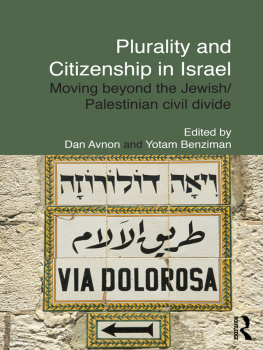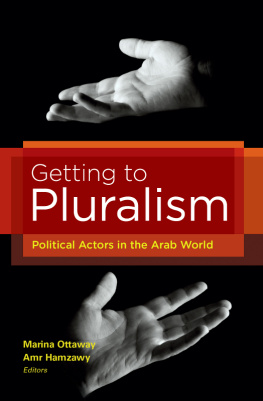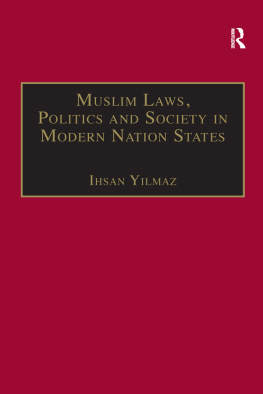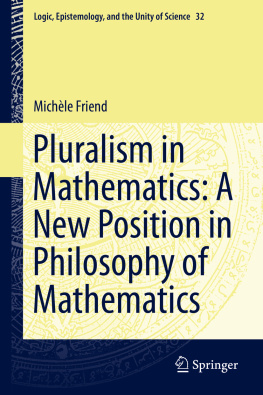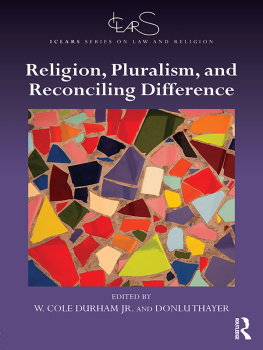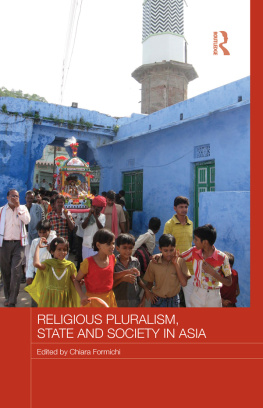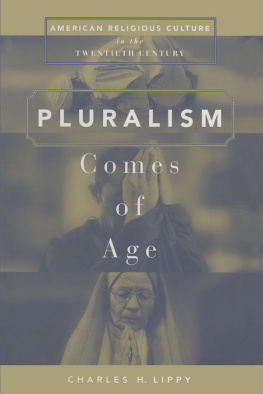Stanford University Press
Stanford, California
2014 by the Board of Trustees of the Leland Stanford Junior University.
All rights reserved.
No part of this book may be reproduced or transmitted in any form or by any means, electronic or mechanical, including photocopying and recording, or in any information storage or retrieval system without the prior written permission of Stanford University Press.
Printed in the United States of America on acid-free, archival-quality paper
Library of Congress Cataloging-in-Publication Data
Tambar, Kabir, author.
The reckoning of pluralism : political belonging and the demands of history in Turkey / Kabir Tambar.
pages cm (Stanford studies in Middle Eastern and Islamic societies and cultures)
Includes bibliographical references and index.
ISBN 978-0-8047-8630-0 (cloth : alk. paper)
ISBN 978-0-8047-9093-2 (pbk. : alk. paper)
1. AlevisTurkey. 2. Religious minoritiesTurkey. 3. Religious pluralismPolitical aspectsTurkey. 4. Islamic sectsTurkey. 5. Islam and stateTurkey. 6. NationalismTurkey. 7. SecularismTurkey. I. Title. II. Series: Stanford studies in Middle Eastern and Islamic societies and cultures.
DR435.N67T36 2014
322.109561dc23
2013036396
ISBN 978-0-8047-9118-2 (e-book)
The Reckoning of Pluralism
POLITICAL BELONGING AND THE DEMANDS OF HISTORY IN TURKEY
Kabir Tambar
Stanford University Press
Stanford, California
Stanford Studies in Middle Eastern and Islamic Societies and Cultures
CONTENTS
ACKNOWLEDGMENTS
THIS BOOK COULD NOT HAVE been written without the support of a number of friends and mentors at various stages. At the University of Chicago, I appreciated the critical engagement by Hussein Ali Agrama, Jean Comaroff, Cassie Fennell, Susan Gal, Brian Horne, Roco Magaa, Saba Mahmood, William Mazzarella, Aye Polat, Elizabeth Povinelli, Danilyn Rutherford, Michael Silverstein, Martin Stokes, Michel-Rolph Trouillot, Nkhet Varlk, Jeremy Walton, and Lisa Wedeen. I thank Anne Chien for her tireless support. While teaching at the University of Vermont, I had the opportunity and space to reconceptualize the project, and the book itself was drafted during a subsequent year spent at the Institute for Advanced Study in Princeton, NJ. The process of writing, thinking, and rewriting was catalyzed by colleagues who read and improved manuscripts headed for journals or responded to public presentations. I am grateful to Michael Allan, Vicki Brennan, Benjamin Eastman, Matthew Engelke, Zeynep Grsel, Sherine Hamdy, Angie Heo, Banu Karaca, Burcu Karahan, Burak Keskin-Kozat, Emily Manetta, Ceren zgl, Aye Parla, Andrew Shryock, Jonah Steinberg, and Berna Turam for their feedback at these junctures. I revised the text while teaching at Stanford University, and I thank my colleagues in the Department of Anthropology for their support and collegiality.
I am especially indebted to a number of friends and colleagues who read the manuscript in its entirety. Joseph Hankins and Kelda Jamison read numerous drafts of chapters and offered intellectual companionship across the many years that I have worked on this text. Laura Helper-Ferris sharpened the writing. Thomas Blom Hansen, Sarah Muir, and Esra zyrek offered discerning and spirited critiques, and Joan W. Scott pressed me to think at the edges of anthropologys disciplinary conventions.
The bulk of the research conducted for this project took the form of ethnographic study in Turkey, and this work depended heavily on the support of various friends and colleagues. Aykan Erdemir, Mustafa en, and Ahmet Tasn provided early assistance and encouragement. Mark Soileau shared his erudition generously. Ahmet Kerim Gltekin, Erden and Melahat zer, and Cihan Pak offered the joy of friendship without suspicion, for which I remain grateful beyond words. I also thank Durmu Aslan, Altan Demir, Teoman ahin, and Ali, Mehdi, and Ali Rza remi for welcoming me into their lives and communities.
Middle East Technical University and Bilkent University offered affiliations and library access in Ankara. Research and writing were funded by the Fulbright Hays Dissertation Research Abroad Fellowship, the Wenner-Gren Foundation, the Institute of Turkish Studies, and the Charlotte W. Newcombe Fellowship. The Institute of Turkish Studies also provided a subvention grant to help cover the costs of publishing the book. I was fortunate to work with Stanford University Press, and I thank Kate Wahl for her commitment to the project.
My parents, Prem and Indra Tambar, have never demanded a return on their support, and their unflinching confidence in my intellectual perambulations, even when seemingly most random and least coherent, has always provided me with a ground and orientation. Siddharth Tambar and Sonal Chandra were the first to encourage me to study anthropology, and so this book is ultimately in their debt.
From ethnography to writing, Kelda Jamison has shared the life-world of this project. The world this text seeks to represent is one she has helped me imagine, conceptualize, and understand. Her influence on the work exceeds delineation. Arav and Rohan joined this project quite late in the day, and happily they return me to the world beyond it.
NOTE ON ORTHOGRAPHY
MODERN TURKISH IS WRITTEN WITH the Latin alphabet. Most letters loosely correspond to characters found in English, but there are a few differences. The Turkish c is pronounced like the English j as in jam. J is pronounced like the final ge of the French rouge. is pronounced ch as in child. is sh as in show. and (i.e., with and without a dot) are comparable to ee and uh respectively. lengthens the vowel preceding it but is not pronounced separately. Umlauts (as in and ) are akin to those in German.
Throughout this book, I make use of modern standard Turkish orthography for most technical Islamic terms. For instance, I use cemaat rather than jama. Where relevant, I note the standard transliteration of Arabic in parenthesis. Exceptions to the use of Turkish orthography include words that are commonly represented in English: I use Shii rather than either Sh (formally transliterated Arabic) or ii (Turkish). I have also rendered proper names of figures from early Islamic history with conventional English spellings, for example, Husayn rather than Hseyin (Turkish). All translations are my own unless noted.
IN THE TIME OF PLURALISM
THE POLITICS OF PLURALISM IS an oxymoron, at least within a certain imaginary of modern political community that has been dominant in Turkey for much of the past century. Within this imaginary, political communities are isomorphic with territorially circumscribed nation-states, and nation-states in turn are imagined as internally homogeneous. Whatever differencesof culture, religion, ethnicity, gender, and classmay exist within such communities, they are supposed to be sublated to a feeling of common purpose that would bind a people together in fraternity and ensure their equal treatment. Politics, in this framing, is a field of action that transcends the pluralities that would otherwise fracture a polity. It is grounded in the sense of a shared past and a collective destiny. As with many nation-states in the past two centuries, the Turkish state sought to cultivate this conception of political belonging by standardizing the language and history of the nation.
In Turkey today the issue of pluralism ignites explosive debate, particularly when it takes form in a historical register. Various social actors, organizations, and international political bodies claim that, from its founding, the Turkish state has policed the uses of language and regulated the writing of history in ways that have promoted discrimination rather than fraternity or equality. These groups denounce the forms of historical erasure, of cultural domination, and of political violence that were deemed necessary to build the nation-state. They prompt questions about the very legitimacy of the modernist project that emerged in the early twentieth century, after the collapse of the multi-religious and multi-ethnic Ottoman Empire. The Turkish Republic today faces an unprecedented challenge to the ideologies of homogeneous nationalism that justified its initial formation. Pluralism represents a historical reckoning with the dominant imagining of Turkeys political modernity.


